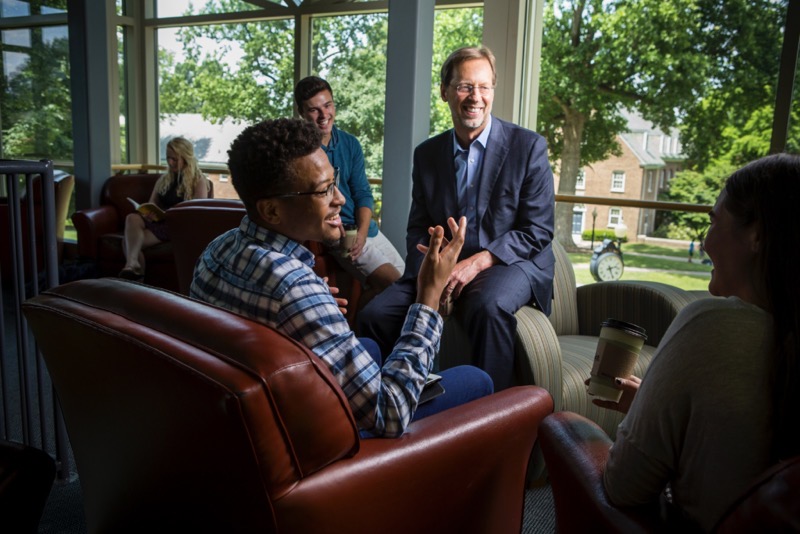Building a Good Society
MELLON FELLOW TAKES THE HELM AT THE ASPEN INSTITUTE
Share

“At their best,” observes Daniel R. Porterfield MN ’89, “nonprofit institutions serve the larger public and all individuals without a preset agenda that causes them to favor special interests over the larger collective. That’s critical to our mission—to participate in the building of a good society for all communities.”
Dr. Porterfield, who has served as President of Franklin & Marshall College since 2011, takes office in June as the new President and CEO of the Aspen Institute. Founded in 1949, Aspen is a nonpartisan organization internationally known for its commitment to fostering public discourse and cultivating leadership.
“I think that all institutions of civil society, as well as the government and the private sector, have an enormous responsibility to facilitate collaboration and dialogue, honesty, and integrity. We need to renew public trust across most institutions,” Dr. Porterfield says.
From the beginning of his career, Dr. Porterfield has melded public service with a deep commitment to education and equity. Shortly after graduating from Georgetown University in 1983, he launched a program at his alma mater to engage college students in teaching English to non-native speakers in Washington, D.C. schools; a few years later he founded a second program there to offer tutoring to at-risk young people. Both programs are still active, 35 years later. In the same year he was named a Rhodes Scholar.
After earning a second B.A. and an M.A. at Oxford, Dr. Porterfield spent four years as a senior aide to U.S. Secretary of Health and Human Services Donna Shalala, then completed a Ph.D. in English as an Andrew W. Mellon Fellow in Humanistic Studies at the CUNY Graduate Center. In 1997 he returned to Georgetown as a faculty member in English, also teaching such courses as “The Needs of Newcomers” and “Public Education at the Crossroads” to support student outreach. Ultimately he was appointed Georgetown’s Senior Vice President for Strategic Development, a post he held until named to the Franklin & Marshall presidency.
Among his proudest achievements there: The American Talent Initiative (ATI), initiated by Franklin & Marshall, coordinated by Aspen and Ithaka S+R and funded by Bloomberg Philanthropies. By 2025 ATI aims to increase by 50,000 the number of Pell Grant-eligible students enrolled in the 290 American colleges and universities that have six-year graduation rates of 70 percent or better. To date 98 institutions have signed on, inspired in part by the F&M model—a decision, under Dr. Porterfield’s leadership, to end merit aid and discounting, redirecting resources to triple need-based aid.
For F&M the result has been an increase of 20 percent in the proportion of first-year students with demonstrated financial need, from 37 percent in 2008 to 57 percent in recent years, and the proportion receiving Pell Grants has risen from one in 20 to one in 5. At the same time, test scores of entering classes have remained steady. “In making a deep investment in need-based aid combined with forming partnerships with very high-achieving educators working around the country in lower-income communities—urban and rural—we have significantly enhanced the academic quality of our institution,” Dr. Porterfield says. “We’ve deepened our student body, we’ve enhanced many of our outcome metrics, and we have seen increased numbers of our students earning placement in top graduate programs and national fellowships.”
In his new role at Aspen, Dan Porterfield plans to emphasize equity and access not only in the organization’s public dialogue initiatives, but also—and particularly—in its education programs. “I believe that the strength of America’s future is directly related to our society’s ability to invest in the young, empower the young, motivate the young, to protect American democracy and American institutions,” he says, laying out an ambitious agenda: quality curricula, better preparation and compensation for teachers, more equitable college admissions, more thoughtful philanthropic investment, greater understanding between higher education and K–12.
“The role of higher education and nonprofit institutions like the Aspen Institute cannot be understated,” Dr. Porterfield says. “Our institutions are the ones that invest in talent regardless of background, identity, income level, or political persuasion. This is crucial for our country, that leading institutions invest in talent from every zip code, from every community.”
Stay Engaged
Get More News
Join our mailing list to get more news like this to your mailbox.
Support Our Work
Help us invest in the talent, ideas, and networks that will develop young people as effective, lifelong citizens.
Ways to Support Us